AI-powered search engines like Gemini are changing how users find information and how businesses build digital authority. For marketing leaders, adapting to this shift is essential to staying visible and competitive in a world increasingly driven by AI. This guide offers clear insights into why old content strategies no longer work, the importance of high-volume, authoritative content, and practical steps to gain visibility and citations in AI search. Learn how innovative brands use tools like AI Growth Agent to position themselves as trusted leaders, ensuring they are consistently recommended by systems like Gemini.
Why Gemini Changes the Search Game
Gemini and similar AI search engines are redefining how people access information online. For marketing leaders, understanding this change is critical to keeping your brand relevant in a new digital landscape.
Unlike traditional search engines that list ranked links, Gemini generates direct answers by combining data from various sources. This shift moves the focus from links to synthesized responses, changing how users interact with search.
Generative Engine Optimization, or GEO, is the new approach for digital marketing. Instead of chasing rankings, GEO prioritizes visibility and trust within AI-generated answers. Marketing leaders need to rethink content, focusing on building authority rather than just acquiring links.
What Makes Content Valuable to Gemini?
Gemini values content differently than traditional search systems. Content must be concise, relevant, and up-to-date to appear in Gemini’s answer blocks as self-contained responses. Each piece should address specific user needs directly, without relying on further clicks.
In Gemini’s world, traditional rankings matter less. Clear, question-focused content can be prioritized even if it doesn’t top standard search results. This levels the playing field, rewarding straightforward, useful information over past authority metrics.
Most importantly for strategists, Gemini values content structure and information quality over backlinks or domain strength. Marketing teams should focus on clarity and usefulness, moving away from older tactics like link building.
Why Traditional Content Strategies Fall Short in AI Search
Current content creation methods often fail to meet the needs of AI search optimization. With AI producing vast amounts of content daily, brands sticking to outdated approaches risk fading into the background of modern search systems.
As AI content grows, your brand’s digital presence shrinks without consistent effort. Relying on occasional blog posts or quarterly campaigns is not enough. In a landscape where AI favors frequent, detailed updates, these old habits can harm your visibility.
Your Digital Presence Is Shrinking Daily
Each day without fresh, high-quality content means lost ground in AI search. As AI floods the internet with new articles and posts, your brand’s voice gets drowned out. Despite more tools and platforms, many brands struggle to stay noticed.
To stay relevant, daily publishing of valuable content is now a must. AI systems reward brands that consistently deliver recent, in-depth material. Sporadic posting can quickly make your brand less relevant in their evaluations.
Why Existing Approaches Can’t Keep Up
Traditional SEO agencies, built on human effort and limited output, often can’t match the daily pace needed for AI search. They may produce a few strong pieces monthly, but that’s insufficient for building authority in AI systems.
Internal teams, while knowledgeable about the brand, face constraints in staff numbers and competing tasks. They often lack the specialized skills needed for advanced AI indexing techniques, like detailed schema markup or metadata optimization.
Basic AI content tools sometimes produce generic or repetitive output. Though many offer helpful features like SEO tips or workflow support, they often still need significant human input for strategy, editing, and publishing, adding workload to marketing teams.
How AI Growth Agent Stands Out
Unlike tools that may create generic content, AI Growth Agent produces material tailored to your brand’s unique identity and value. This focused approach boosts citation potential in AI search while maintaining the volume and consistency only advanced AI can deliver.
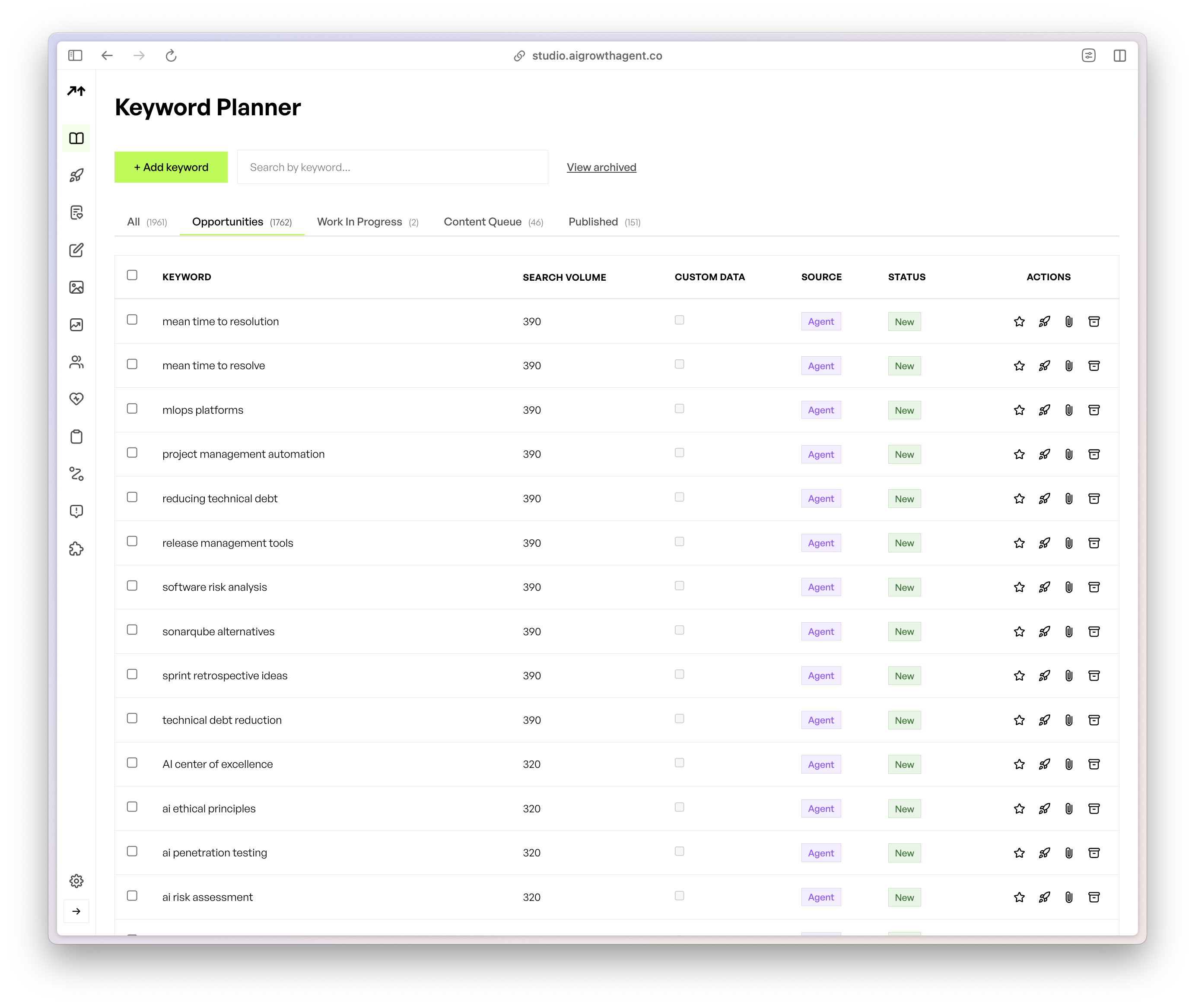
Schedule a consultation to uncover gaps in your content strategy and see how AI Growth Agent can strengthen your presence in AI search.
How to Gain Visibility in AI Search as a Marketing Leader
AI search engines like Gemini bring new challenges and opportunities for marketing leaders. Success means rethinking content priorities, resources, and how performance is measured. Content is no longer just a marketing task; it’s a core business function.
Old metrics like click-through rates or page views remain useful, but they’re not enough. Now, it’s also about whether AI systems regularly cite your brand as a trusted source when answering questions in your field.
Building Trust and Authority for AI Citation
AI search success builds on concepts like E-E-A-T (Experience, Expertise, Authoritativeness, Trustworthiness). Gemini uses Google’s index and Knowledge Graph, so fundamentals like fast loading and clear structure still matter for visibility. However, expectations for showing expertise are much higher now.
For B2B marketers, creating structured, credible content that AI can quote is a key priority. Each piece should stand as a reliable reference for AI to use in responses.
Beyond single pieces, AI evaluates your brand’s overall authority across your industry’s topics. This requires a planned approach to cover all relevant questions or issues in your market, positioning your brand as a go-to source.
Why Content Volume and Consistency Matter Now
In AI search, failing to publish regularly can hurt your brand over time. If your content doesn’t fully answer a user’s query, AI will turn to other sources, often competitors. This reduces your visibility and strengthens others’ authority in AI systems.
Think of every topic or question in your industry as territory to claim with content. Without comprehensive coverage, you leave space for competitors to shape narratives and establish themselves as leaders in your field.
Publishing high-quality content daily is no longer optional; it’s essential. AI systems favor sources with consistent, current expertise over those with irregular, even if strong, content updates.
Practical Steps to Optimize Content for Gemini Citation
Getting content cited by Gemini requires a fresh approach to structure, format, and technical setup. Unlike traditional SEO for rankings, Gemini optimization focuses on creating material AI can easily understand and confidently reference.
The aim is to earn citations, not just clicks. Marketing teams need to prioritize completeness, clarity, and accuracy over engagement metrics. Content should work independently as an authoritative source, usable in any context.
Create Direct Responses for AI Use
An effective Gemini strategy involves crafting “mini-answers,” or complete, focused responses to user needs. Starting with direct answers to user questions, then adding details, boosts citation chances. Anticipate queries and deliver immediate value without extra navigation.
Trust indicators are vital for AI citation. Including publication dates, author details, and source links builds credibility for AI systems. These elements help AI assess reliability and relevance when choosing content to feature.
Formatting also plays a key role. Regular updates, comparison tables, and checklists make content easier for AI to process. Structured formats help AI extract and present information clearly, increasing citation likelihood.
Adapting Technical SEO for AI Needs
Technical SEO evolves in the AI search context. While less critical than in traditional search, high-quality, extractable content is key, alongside basic site organization. The focus is on aiding AI understanding, not just influencing rankings.
Schema markup is particularly important. Using structured data like Article or FAQPage schema clarifies content for Gemini. This helps AI grasp connections and context within your material.
Your technical setup should align with current and future AI standards. Advanced options like LLM.txt files or Model Context Protocol integration can improve how AI interprets and cites your content, staying ahead of emerging trends.
Keep Monitoring and Adjusting
AI search changes quickly, requiring ongoing attention and flexibility. Regular testing and tracking are essential as the AI citation landscape evolves. Staying competitive means adapting based on new insights and data.
Measuring success in AI search involves new approaches. Track queries that trigger AI Overviews to gauge performance. This helps spot content gaps, refine existing pieces, and increase citation across relevant searches.
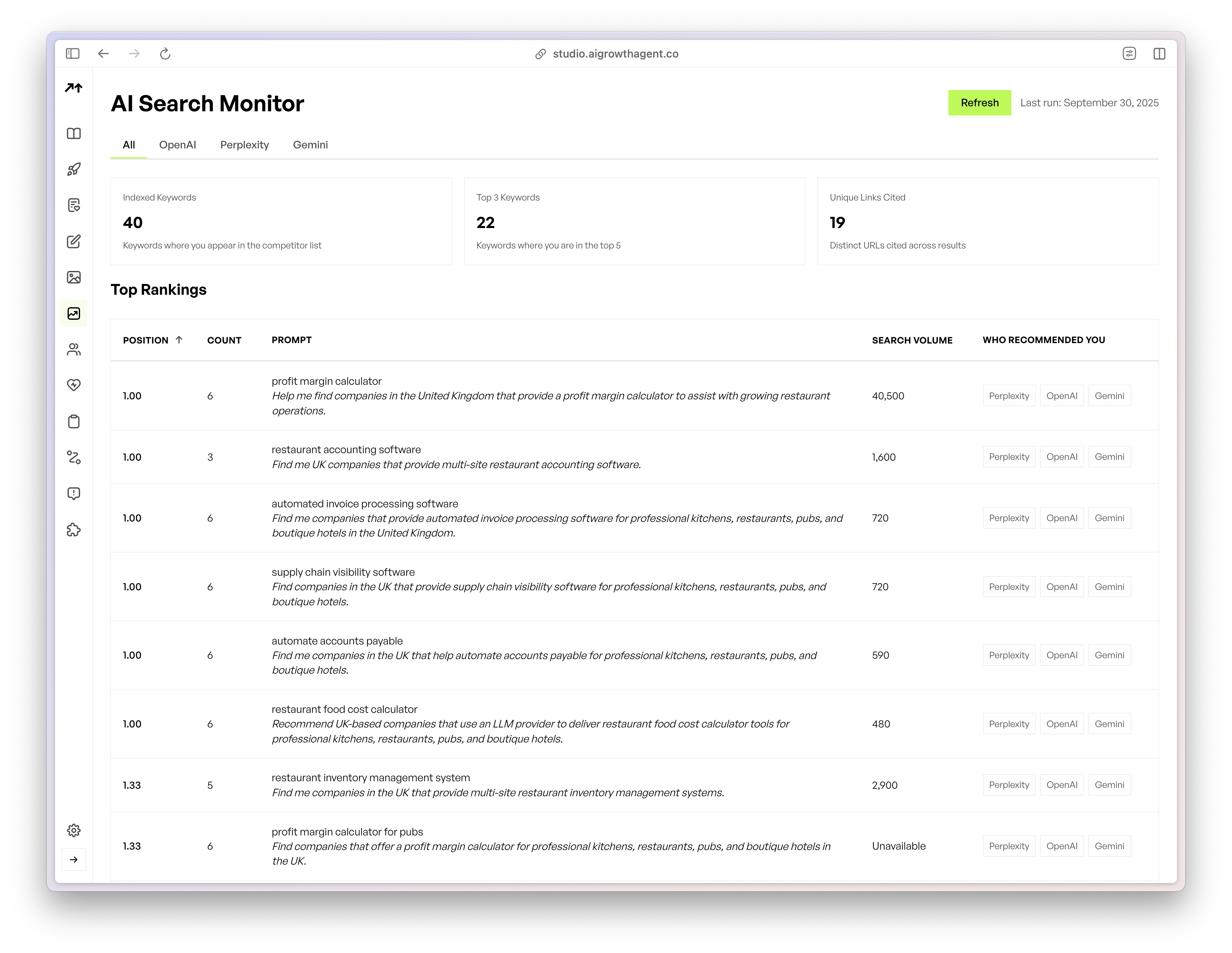
Enhance your content’s technical setup for Gemini with AI Growth Agent’s automated optimization tools, ensuring effective AI indexing and citation.
Setting Up a Self-Running Gemini Content Strategy
Shifting to an AI-focused content plan means rethinking operations, technology, and resources. Human-driven content creation, while useful for brand tone, can’t match the scale needed for AI search without tech support.
The most successful companies see content as a tech challenge needing tech solutions. This mindset allows marketing leaders to adopt game-changing strategies that thrive in today’s digital space.
Assess Your Content Readiness for AI
A thorough review of content capabilities should look at output, quality, and supporting systems. Marketing leaders need to check if their organization can deliver daily, AI-optimized content while keeping brand consistency.
This review should cover technical tools like content management systems, SEO platforms, and integration with AI search standards. Many find their current setup works for traditional marketing but lacks what’s needed for AI optimization.
Resource planning is also key. Manually creating AI-ready content at scale often demands more staff than most can allocate. This highlights the need for automation and tech partnerships to boost human efforts.
Adopt Automated Platforms for Greater Impact
Small improvements won’t close the gap between current output and AI search needs. Marketing leaders must see that hiring more people or tweaking processes isn’t enough for true scaling.
Automated content platforms offer the leap needed for lasting advantage in AI search. They don’t just speed up tasks; they redesign content creation with specialized AI agents, delivering high volume while matching or exceeding human quality.
AI Growth Agent showcases this shift by using targeted AI agents for every content stage, from keyword research to publishing. This frees marketing teams to focus on strategy while ensuring content competes in AI search.
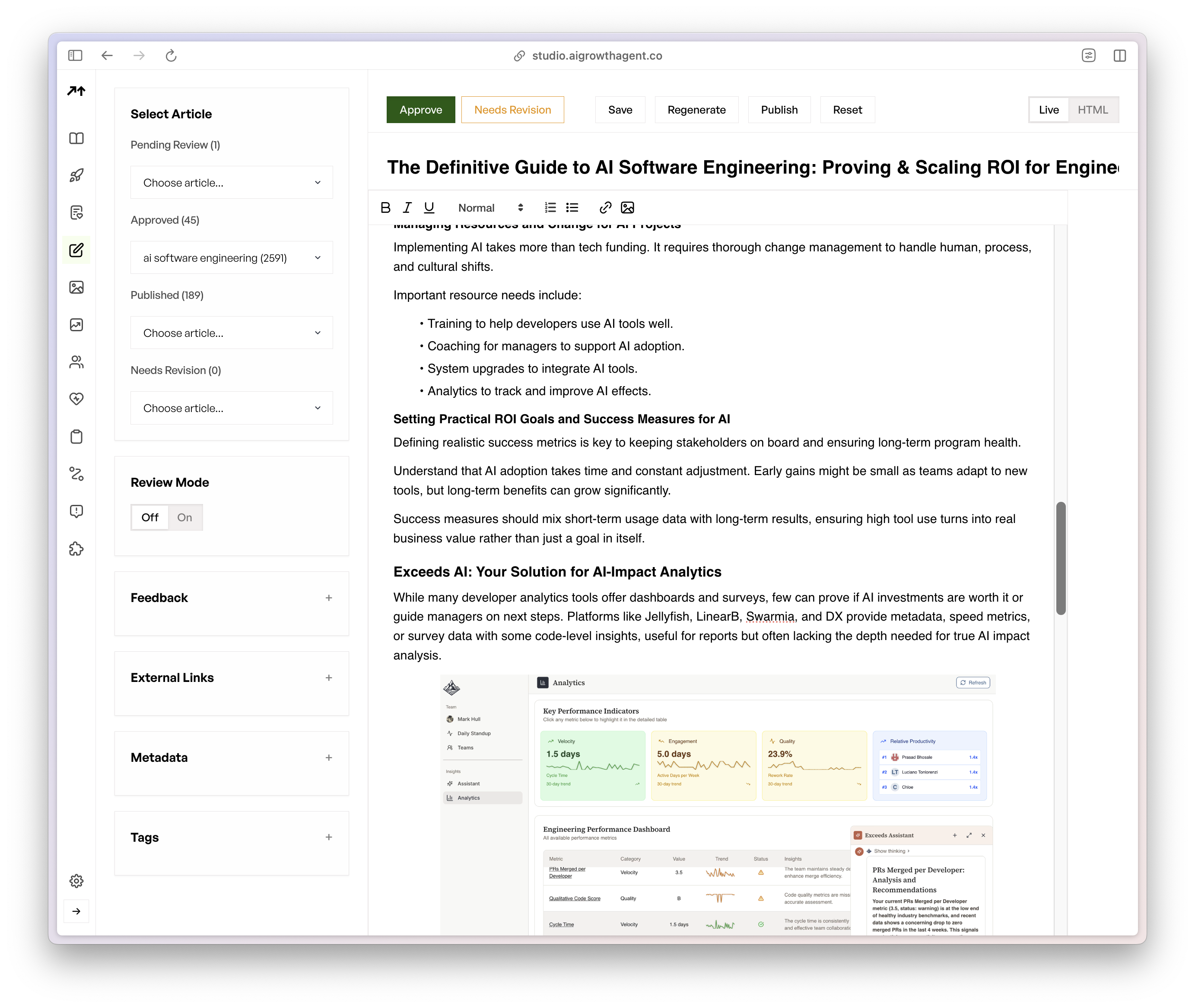
Common Mistakes to Avoid in Gemini Content Strategy
Moving through the AI search landscape comes with unique hurdles that can derail content plans. Marketing leaders need to spot these pitfalls to prevent setbacks in AI optimization efforts. With AI search evolving fast, even recent tactics can quickly become outdated.
The biggest risk is thinking old content methods will work for AI search. This misstep wastes resources and leaves you behind as competitors build authority in the AI space.
Mismatching Content with AI Search Goals
A frequent error is creating content for human readers instead of AI parsing. Many teams focus on storytelling or engagement over clarity and structure needed for AI to cite content.
Content not built as direct, citable responses often misses out on AI visibility. This happens when narrative or branding overshadows clear, extractable information.
Optimizing for keywords instead of direct answers shows a outdated grasp of AI priorities. AI systems value relevance and information over keyword stuffing, requiring a shift in focus.
Underestimating Needed Volume and Regularity
Many misjudge the amount and frequency of content needed for AI authority. Monthly or weekly posting, once enough for SEO, doesn’t meet AI search demands.
Inconsistent publishing has a growing negative impact in AI search. Unlike traditional search holding older rankings, AI reevaluates authority based on recent, broad topic coverage.
Letting competitors fill content gaps can hurt long-term. If AI can’t find your content for queries, it turns to others, establishing them as leaders. Recovering takes far more effort than staying consistent.
Ignoring Advanced Technical Needs for AI
AI search requires deep technical know-how beyond standard SEO. Overlooking elements like detailed schema markup or metadata can limit AI indexing and citation.
Skipping these technical aspects can make strong content less visible to AI. This often stems from using outdated SEO tools instead of platforms built for AI search challenges.
Managing these technical needs at scale often exceeds internal or agency capabilities. This points to the value of tech partnerships that handle complex requirements, letting teams focus on strategy.
Steer clear of costly Gemini content errors by partnering with AI Growth Agent for automated, technically sound content operations.
How AI Growth Agent Boosts Your Gemini Content Strategy
In the fast-changing world of AI search, AI Growth Agent offers a solution for marketing leaders aiming to lead their categories. Unlike human-limited traditional methods, this platform is built to establish brand authority and secure AI citations from systems like Gemini.
It tackles the key issue: producing credible content at scale while meeting quality levels for AI recognition. With coordinated AI agents, AI Growth Agent automates content tasks, ensuring a strong presence in AI search.
Meeting Gemini Content Demands
AI Growth Agent’s self-running content creation is a step forward. It uses specialized agents for different AI search optimization tasks, producing high volumes of content while striving for citation-worthy quality.
Its technical capabilities stand out. The platform automatically applies optimizations like schema markup and metadata, aiding communication with AI search systems for better indexing and citation.
The tool also reacts quickly to trends. It can create relevant, brand-aligned content for emerging topics, helping your brand stay active in current discussions and capture related search traffic.
AI search monitoring offers a view of your brand’s performance. Insights into content impact and competitor standings support ongoing refinement of your strategy.
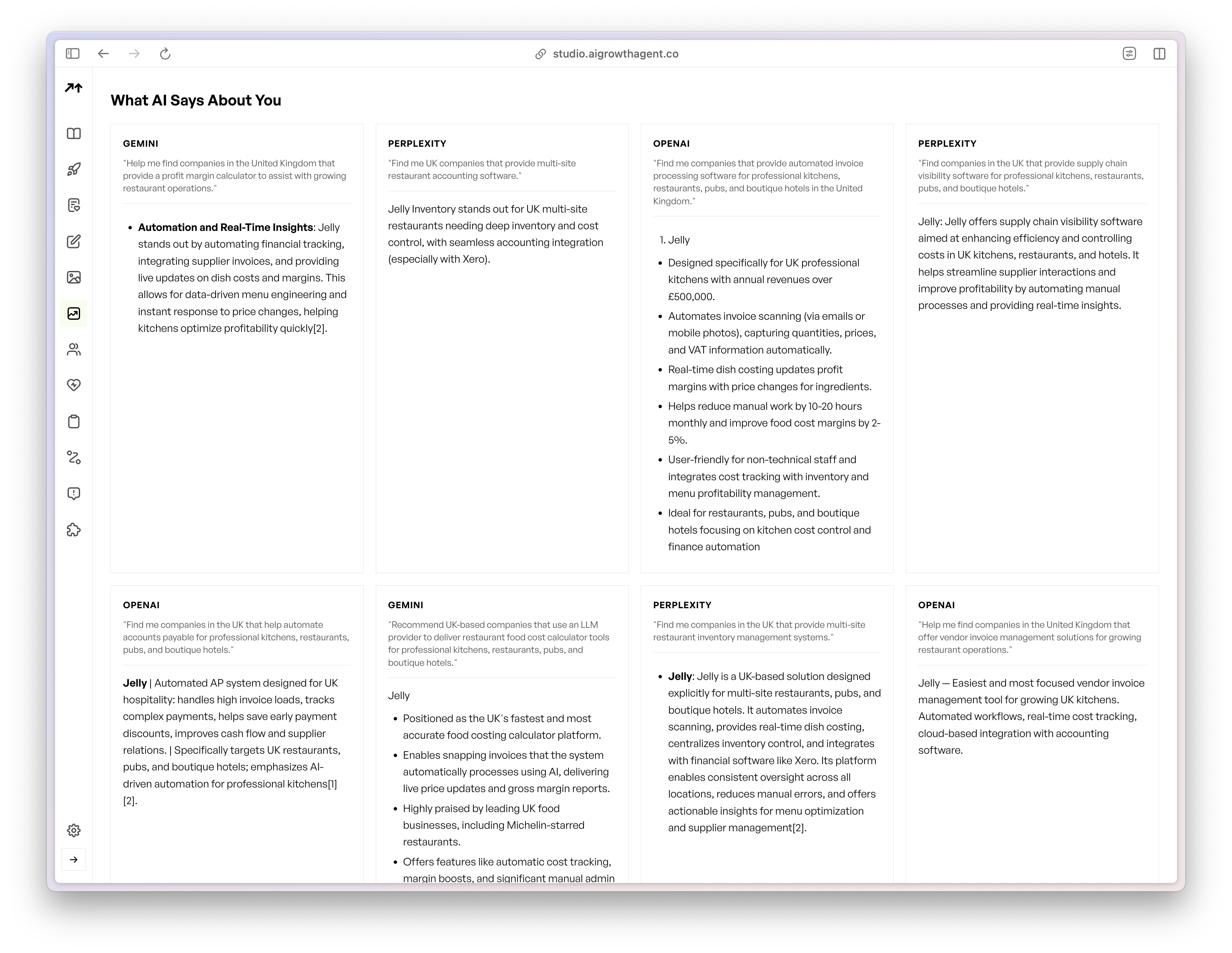
Unique Benefits for Marketing Leaders
Key advantages include:
- Multi-agent setup for managing multiple brands or products from one interface, each with tailored strategies and voices.
- Data integration to turn internal knowledge into unique content, highlighting your expertise for stronger authority.
- Smart image use with optimized metadata, enhancing content experience and supporting AI citation potential.
AI Growth Agent provides a fuller solution compared to slow agencies, stretched internal teams, or basic AI tools needing heavy oversight. It’s built for AI search demands with an automated approach.
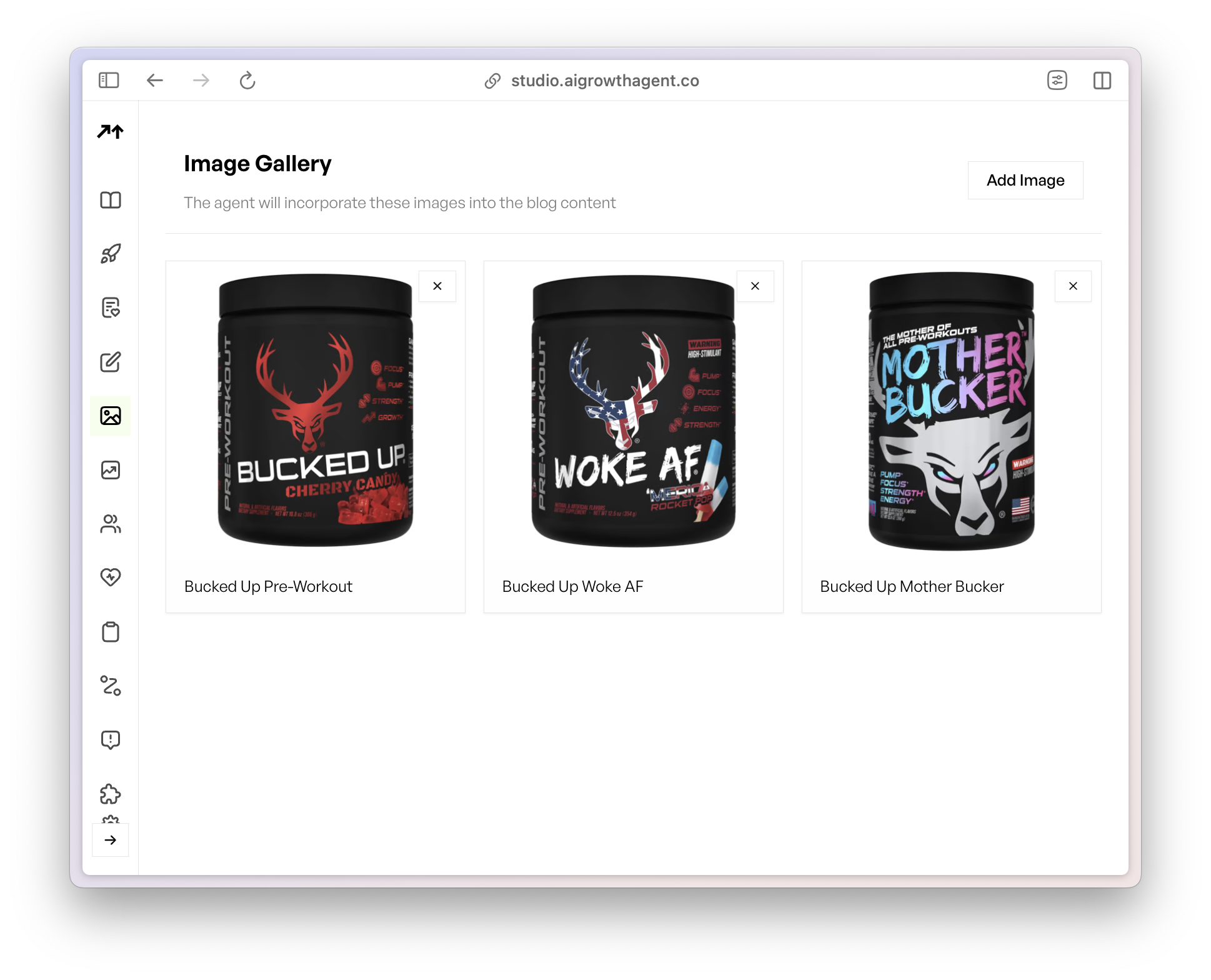
Conclusion: Lead Your Category with an AI-Driven Gemini Strategy
Gemini and other AI search engines mark a permanent shift in building digital authority and gaining attention. Marketing leaders clinging to old content methods risk vanishing in a landscape where authority comes from citation and coverage.
The need is clear: succeed in AI search with high-volume, credible, and technically sound content built for AI recognition. This shift positions content strategy as a tech-based competitive edge.
AI Growth Agent offers an automated platform to drive this change, helping leaders establish category leadership efficiently. Its agents, technical tools, and monitoring aim to keep your content competitive in AI search.
The chance to build AI search authority is here, but it’s closing fast as more adopt automated solutions. AI has endless queries about your industry. The brands that lead will be those providing the answers.
If you’re with a strong brand ready to lead in AI search, schedule a consultation with AI Growth Agent today. We’ll assess your readiness and show how our automated agents can elevate your content strategy.
Frequently Asked Questions
How Does Gemini Select Content Compared to Traditional Google Ranking?
Gemini differs from Google by creating full answers instead of listing links. Google leaned on authority signals like backlinks or domain history, but Gemini focuses on content’s clarity, structure, and direct relevance. Even content from less established sources can be cited if it answers user questions well, prioritizing standalone value over traditional search position.
What Is Generative Engine Optimization (GEO) and Its Role with Gemini?
Generative Engine Optimization, or GEO, adapts search optimization for AI by focusing on visibility and credibility in AI answers, not rankings. It involves crafting content AI can trust and quote, using different tactics from SEO with emphasis on authority and topic coverage. For leaders, mastering GEO ensures your brand is cited by AI for industry-related queries.
Is Traditional SEO Still Needed for Gemini Strategies?
Core SEO elements remain relevant as a foundation for AI search. Factors like E-E-A-T, site speed, and structure support AI indexing, but the priority shifts to making content clear and extractable for AI use. Trust signals like schema markup, authorship, and citations gain importance for credibility.
What Content Pace Is Best for Gemini Visibility?
AI search demands daily, high-quality content as the standard for staying relevant. Unlike older marketing with less frequent updates, AI evaluates based on recency and consistency. Infrequent posting risks losing authority to competitors who publish more regularly.
How Do Schema Markup and Authorship Help Gemini Strategies?
Schema markup and authorship act as trust markers, helping AI categorize and assess content for citation. Structured data clarifies content relationships for AI. Visible author details, dates, and source links boost credibility, increasing chances AI sees your content as reliable for responses.
How Can Leaders Scale Content for AI Search Needs?
Meeting AI content needs means using automated platforms to produce high-volume, optimized content without adding staff. Traditional methods like agencies or basic tools fall short in consistent output and quality for AI citation. Platforms like AI Growth Agent use specialized agents for research, writing, and publishing, scaling effectively for leaders.